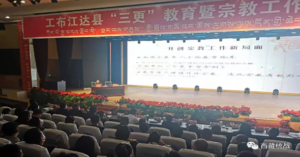The Chinese Communist Party (CCP) is launching its “Three Shifts” educational and religious work campaign, ahead of its centenary anniversary this month. An event was held in Tibet on June 17 attended by nearly 500 people, including leaders from various units of the county and representatives from middle school and primary schools; the event was presided over by Xiaohe, the Deputy Mayor of Nyingtri City in Gongbu Gyada [Ch:Jiangda] County.
The “Three Shifts” campaign’s edicts are: 1) Political standards must be higher; 2) the Party spirit requirements must be stricter and 3) Organisational discipline must be stronger.

Public propaganda event
Photo: Tibet Watch
Speaking at the event in Tibet, the Deputy Mayor clarified the requirement for everyone to observe the “Three Shifts”. Implementation of this campaign was said to be a path for what is often called a new era, which is believed by the Chinese Communist Party to be a stage in the process of change in society. The Deputy Mayor emphasised that everyone should understand the history of the CCP and its policies on religion. This follows on from the Seventh Tibet Work Forum held in Beijing in August last year, presided over by Chinese President Xi Jinping, the outcome of which indicated the Chinese leadership’s decision to continue its policy of absolute control and assimilation in Tibet. At the time, Chinese state media reported that Xi laid out a “strategy of governing Tibet in the new era” that includes “Sinicisation” of Tibetan Buddhism and improving the ability of CCP organisations and members at all levels “to deal with major struggles and prevent major risks.” There was considerable emphasis on ensuring “national security” and “ethnic solidarity”, ie an indication of China’s determination to impose absolute control over, and repression of, Tibetan identity. In propaganda meetings since then, these measures of marginalising Tibetan identity have often been interpreted in the Chinese state media as “the spirit” of the Seventh Tibet Work Forum.
In his closing speech, the Deputy Mayor stressed that Tibetan Buddhism must adapt to the socialist society, give full respect to the role of CCP-appointed eminent monks, and take a clear-cut stand to eliminate the negative impact of the 14th Dalai Lama’s use of religion.




 Print
Print Email
Email